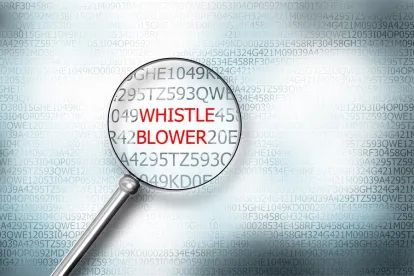Proposed Legislation Creates Rewards Program for Whistleblowers of Foreign Government Corruption
Third Post in a Three-Post Series
Newly proposed legislation, if passed, will authorize a whistleblower program for individuals providing law enforcement with information leading to the seizure, forfeiture, and/or repatriation of foreign stolen assets that come within the possession or control of any United States person.
In early March, the House Financial Services Committee released three proposed bills to codify many of the suggested reforms discussed during ongoing conversation among financial agencies, law enforcement, financial institutions, and commentators regarding the Bank Secretary Act (“BSA”) and Anti-Money-Laundering (“AML”) and Combating the Financing of Terrorism (“CFT”) laws. The first two proposed bills are discussed here and here.
In this post, we summarize the last of the three proposed bills, The Kleptocracy Asset Recovery Rewards Act (the “Bill”). The Bill allows the Department of Treasury to provide whistleblowers not only with monetary incentives but also protective measures, including asylum for the whistleblower and his or her immediate family. As we will discuss, the Bill proposes a unique whistleblower program focused on foreign corruption, and which differs in important ways from other, established government whistleblower programs.
The Purpose of the Bill: Defend the Rule of Law Against Kleptocracy
Almost ten years ago, the Department of Justice announced its Kleptocracy Asset Recovery Initiative, which “redoubled commitment on behalf of the United States Department of Justice to recover” funds obtained by foreign government officials through bribes and kickbacks. As a result of this initiative, the Justice Department targeted those officials who retained bribes through forfeiture actions and whose actions were otherwise outside the scope of the Foreign Corrupt Practices Act(“FCPA”).
Given this background, the Bill creates a reward program for whistleblowers who help identify those persons who receive and retain stolen assets linked to foreign government corruption. According to the Bill’s Findings (“Findings”), “$20 billion to $40 billion has been lost to developing countries annually through corruption.” This “[l]oss of assets due to corruption” results in fewer resources to build “strong financial, law enforcement and judicial institutions in aid of fighting terrorism.”
The Bill defines “foreign government corruption” as the “bribery of a foreign public official, or the misappropriation, theft or embezzlement of public funds or property by or for the benefit of a foreign public official.” Per the Findings, such corruption “can take many forms but typically entails government officials stealing, misappropriating, or illegally diverting assets and funds from their own government treasuries to enrich their personal wealth directly through embezzlement or bribes to allow government resources to be expended in ways that are not transparent and may not either be necessary or be the result of open competition.” One instance noted in the Bill was the 2014 forfeiture of $480 million in corruption proceeds hidden in bank accounts belonging to the Nigerian dictator Sani Abacha and his co-conspirators – many of these bank accounts resided in the United States. As a result, the purpose of this bill is prevent complicity by financial institutions in the United States in the ongoing hiding of stolen assets of foreign governments and its officials.
The Bill comes on the heels of the Panama Papers’ release, which we have previously blogged about extensively. In May 2016, the anonymous source of the Panama Papers drafted a statement, entitled the “Revolution Will Be Digitized,” calling for more protections for whistleblowers (“Statement”). In it, the source, named only as John Doe, states “Legitimate whistleblowers who expose unquestionable wrongdoing, whether insiders or outsiders, deserve immunity from government retribution, full stop. Until governments codify legal protections for whistleblowers into law, enforcement agencies will simply have to depend on their own resources or on-going global media coverage for documents.”
More broadly, the Statement also declares, “Income inequality is one of the defining issues of our time. It affects all of us, the world over. The debate over its sudden acceleration has raged for years, with politicians, academics and activists alike helpless to stop its steady growth despite countless speeches, statistical analyses, a few meagre protests, and the occasional documentary. Still, questions remain: why? And why now? The Panama Papers provide a compelling answer to these questions: massive, pervasive corruption.”
The global growth of kleptocracy, money laundering and tax evasion, and the links to human rights abuses and expanding income inequality, indeed has been drawing increasing attention and concern. As we blogged, FinCEN itself issued in June 2018 an “Advisory on Human Rights Abuses Enabled by Corrupt Senior Foreign Political Figures and their Financial Facilitators” to highlight the connection between corrupt senior foreign political figures and their enabling of human rights abuses. The Bill represents a small step towards addressing this troubling trend.
The Whistleblower Program
Given this purpose, the Bill establishes a whistleblower program which provides financial incentives for identifying and recovering stolen assets linked to foreign government corruption. Under this program, whistleblowers who come forward with information that leads to the restraining, seizing, forfeiting, or repatriating of “stolen assets” linked to a foreign government corruption may be entitled to a reward of up to $5 million.
Stolen assets are defined as “any ‘financial assets’ within the jurisdiction of the United States, constituting, derived from, or traceable to, any proceeded obtained directly or indirectly from foreign government corruption.” And “financial assets” are further defined broadly and rather vaguely as “any funds, investments, or ownership interests,” the exact definition of which has been left up to the Secretary. The entire rewards program is limited to payments totaling $25 million on a yearly basis, although the President may waive this limitation if appropriate. While a whistleblower may not receive a reward greater than $5 million, he or she and any immediate family may be offered asylum or other protection measures to mitigate the risk of possible retaliation. According to the Bill, the monetary reward is meant to provide the financial means to provide for the whistleblower’s well-being and to avoid retribution.
Notably, officers or employees of any entity of the Federal, State or local government or of a foreign government who, while in the performance of official duties, furnishes information are not eligible for a reward. Nor are whistleblowers who are convicted of criminal conduct arising from their role in planning, initiating, directly participating in, or facilitating the actions that led to the assets of the foreign state or government entity being stolen. This issue figured prominently in the controversial decision of the IRS to award $104 million to former Swiss banker Bradley Birkenfeld, who received his enormous payout despite having pleaded guilty to assisting the very same massive tax evasion scheme that was the focus of his information to the government.
The rewards program closes some gaps in current whistleblower protection for foreign government corruption information. As noted in the Bill, “recovery of stolen assets linked to foreign government corruption and the proceeds of such corruption may not always involved a BSA violation or lead to a forfeiture action. In such cases there would be no ability to pay rewards under existing Treasury Department authorities.” As such, the Bill broadens the whistleblower protection otherwise found under the FCPA (as amended by the Dodd-Frank Act), which protects whistleblowers whose reports of bribery prohibited under the Act lead to the successful enforcement of the FCPA. The FCPA itself only applies to those who give bribes, rather than those who receive bribes, and the Department of Justice has used the criminal money laundering statutes in order to indict foreign officials who allegedly received bribes and who are beyond the reach of the FCPA. Under the Bill, the information provided need only lead to the restraining, seizing, forfeiting, or repatriating of stolen assets and is not tied to the successful prosecution under the FCPA (or any act for that matter).
The rewards program is also narrower in both recovery potential and protection than other Federal rewards programs. The FCPA and the IRS’s whistleblower programs, among others, provide payouts as a percentage of the total amount seized or forfeited as a result of the information provided. Under the current iteration of the Bill, a reward is capped at $5 million (unless the Secretary of the Treasury personally authorizes a greater reward) with no connection to the amount of recovery – this is significant because the Bill alludes to billions of dollars’ worth of foreign assets lost to developing countries as a result of foreign corruption. Presumably whistleblowers will not share any percentages of the potentially huge forfeiture amounts.
Interestingly, this Bill, as well as the Corporate Transparency Act of 2019, blogged about in part two of this three part series, somewhat answers the Statement of the Panama Papers’ anonymous source. But as written, the Bill would not go as far to provide protection for whistleblowers specifically named in John Doe’s Statement such as Edward Snowden or Bradley Birkenfeld. On the other hand, the Corporate Transparency Act appears to directly respond to the Statement’s claim that “the United States can clearly no longer trust its fifty states to make sound decisions about their own corporate data. It is long past time for Congress to step in and force transparency by setting standards for disclosure and public access.”
The Up-Shot
What does this mean for financial institutions? There is always a risk with such reward programs that employees will go directly to the government rather than their employer if they determine they have information regarding foreign government corruption. In the context of a financial institution’s obligations under the BSA, a failure to alert the institution of possible sheltering of stolen assets may implicate the institutions’ duties. As a result, a culture of compliance is important – ensuring that employees feel comfortable raising suspicious activity and believe their concerns are being heard. The Bill also would increase the pressure on U.S. financial institutions to vet fully the foreign business that they are doing, because the Bill would incentivize potential whistleblowers to emerge from abroad.



 />i
/>i

